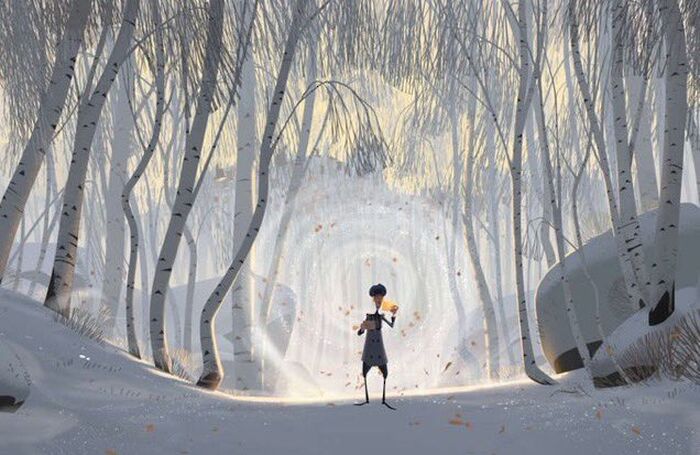I Lost My Body is a treat for the senses
Combining gorgeous animation with an imaginative soundtrack, I Lost My Body is an unexpectedly seasonal delight, says Hannah Bowen
‘Adult animation’ can still read as an oxymoron to some. Aside from a few celebrated examples such as Persepolis, Mary and Max, and Waltz With Bashir (as well as monstrosities like Sausage Party) it remains disappointingly underacknowledged, at least in the West. As such, it’s a delight to see Jeremy Clapin’s debut animated feature I Lost My Body released on Netflix.
This is a rich sensory world – from the squelch of a squished eyeball to the pitter patter of a disembodied hand
The film centres on a vaguely Gogolian sentient detached hand awakening in a Paris dissection lab. It then breaks free, embarking on a perilous adventure in search of its owner, a young man named Naoufel. The plot alternates between the hand’s escapades and two strands of flashback. One recollects Naoufel’s childhood in Morocco and tragic early loss, the other his day to day efforts to get by in Paris. The former is in black and white, the latter in colour. This structure and the central plot conceit allow for a meditation on time, memory and place (at one point the hand stands on a ledge that bears the grafitti “I AM HERE”) that is distinctly existential.
The poetic visuals add to this contemplative quality. Early on in the film we see a shot of sand slipping through Naoufel’s fingers as a young boy on the beach, a symbolically loaded image if ever there was one. This impression is echoed texturally later in the film as flashbacks from the beach are juxtaposed with the hand shifting through snow on the ground. In linking past and present, this emphasises the distance between them through the contrast.
In one exceptionally beautiful moment, Naoufel climbs onto the roof of his flat at sunset and gazes out onto the horizon, a red construction crane towering overhead, as the sky and windows of the surrounding buildings catch fire with the sunlight. The scene does little to advance the plot except perhaps as foreshadowing, but it stands out as a moment of quiet wonder.
One important component of this scene’s beauty is the music accompanying it. Dan Levy’s soundtrack is remarkable, with evocative electronic melodies that occasionally recall Phillip Glass punctuated in a couple of scenes by diegetic French rap. The film’s sound design as a whole greatly enhances its sensory richness, from the squelch of a squished eyeball to the pitter patter of the hand as it scuttles through the city.
The concerted subtlety and slow pace mean I Lost My Body isn’t for everyone, although at one hour and 20 minutes its length saves it from dragging. Contemplation prevails over characterisation, a fact most evident in the relationship between Naoufel and his love interest Gabrielle. The romantic plot line consists of Naoufel tracking down Gabrielle, a young woman he shared a chance profound conversation with entirely over her apartment intercom when delivering a pizza. In order to pursue her, he takes a job as her uncle’s apprentice. This story has its charming moments but is undeniably creepy as well, an uncomfortable ambivalence addressed by the film in one notable scene.
I couldn’t help feeling frustrated at how underdeveloped Gabrielle seemed at times as a character, although given the film’s introspective tone this applies to Naoufel as well. Despite this, some of the more peripheral (and admittedly, stereotypical) characters and their quirks are used to comic effect, such as Naoufel’s lecherous cousin and the ill-tempered librarian.
So, if you have any time on your hands this break (sorry, I just had to) and don’t mind slower-paced films, I Lost My Body is a true original – an eccentric yet understated gem with a gorgeous soundtrack and seasonally fitting snowy ending to boot.
 Features / Should I stay or should I go? Cambridge students and alumni reflect on how their memories stay with them15 December 2025
Features / Should I stay or should I go? Cambridge students and alumni reflect on how their memories stay with them15 December 2025 News / Cambridge study finds students learn better with notes than AI13 December 2025
News / Cambridge study finds students learn better with notes than AI13 December 2025 News / Uni Scout and Guide Club affirms trans inclusion 12 December 2025
News / Uni Scout and Guide Club affirms trans inclusion 12 December 2025 Comment / The magic of an eight-week term15 December 2025
Comment / The magic of an eight-week term15 December 2025 News / News In Brief: Michaelmas marriages, monogamous mammals, and messaging manipulation15 December 2025
News / News In Brief: Michaelmas marriages, monogamous mammals, and messaging manipulation15 December 2025










